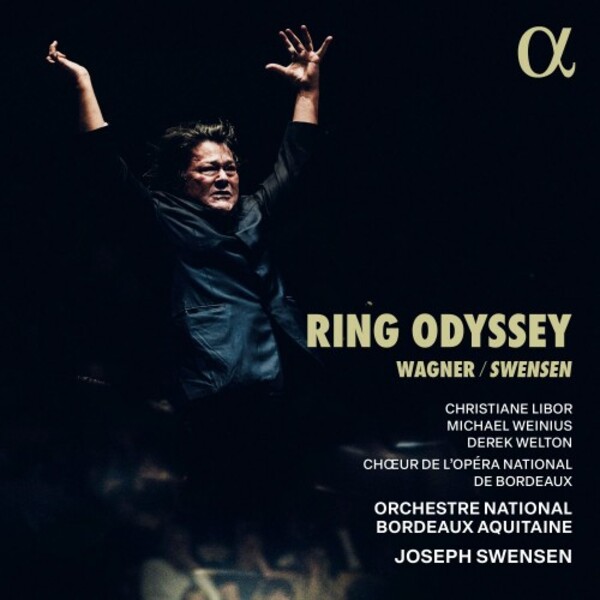WAGNER Ring Odyssey (Swensen)
View record and artist detailsRecord and Artist Details
Genre:
Opera
Label: Alpha
Magazine Review Date: 11/2024
Media Format: CD or Download
Media Runtime: 128
Mastering:
DDD
Catalogue Number: ALPHA1072

Tracks:
| Composition | Artist Credit |
|---|---|
| (Der) Ring des Nibelungen: Complete, Movement: Highlights |
Richard Wagner, Composer
Bordeaux National Opera Chorus Bordeaux-Aquitaine National Orchestra Christiane Libor, Soprano Derek Welton, Bass-baritone Joseph Swensen, Conductor Michael Weinius, Tenor |
Author: David Patrick Stearns
However much Wagner’s uncut 18-hour Ring cycle is one of the ultimate epic immersion experiences, even staunch Wagnerites might be willing to forgo their Solti and Karajan sets for something shorter that won’t bore spouses and keep you up late at night. Lorin Maazel’s arrangement Ring without Words is a seamless alternative to so-called ‘bleeding chunks’ of concert-hall Wagner excerpts. And now conductor Joseph Swensen has a non-epic Ring (one of several out there) that also includes chorus and three singers in multiple, hard-to-cast roles. If Wagner has ever been sensible, it’s here. There are downsides that Ring neophytes might not mind, though seasoned listeners may feel differently.
Swensen’s choices are solid. Das Rheingold is heard only in orchestral excerpts, including the famous slow-germinating opening and the descent into the factory noises of Nibelheim, but basically taking Wagner at his word: this is a prelude to the Ring cycle proper, though there’s much less of it here than usual.
The opening storm music in Die Walküre doesn’t always make it into these pocket Rings but does so here, working well and leading into the Sieglinde-Siegmund interactions, though Sieglinde’s vocal line is initially replaced by oboe. When Sieglinde’s voice is heard, it’s the first singing in this Ring Odyssey and is in her lower range, as if to introduce virgin ears to Wagnerian singing gently. The ecstatic Winter Storm love duet takes the Odyssey to the end of Act 1. Die Walküre Act 2 is briefly excerpted without voices, skipping parts that are among my personal favourites in the entire Ring (such as Brünnhilde’s ‘Siegmund! Look at me!’) but which would lose their meaning without words and dramatic context.
It’s here that Swensen’s logic falls into place: he chooses passages that lend themselves to plot-point sub-headings, printed in English in the booklet. Example: Act 3’s Ride of the Valkyries not just galloping into place but described as retrieving the souls of the dead warriors. Unfortunately, where there’s usually a whole herd of Valkyries there is now just one, and she sounds a bit lonely. The next voice is Wotan singing ‘Loge, hear! Listen to my word!’ leading to the Magic Fire Music and Wotan’s Farewell.
Siegfried begins with ominous sleeping-dragon music. The newly human Brünnhilde has lots of love exaltation both in Siegfried and Götterdämmerung, leading to the particularly welcome Gibichung Vassals’ chorus that heightens the overall contour as the opera pushes towards its conclusion. Rhinemaidens are represented by instruments rather than voices; Siegfried has his Funeral March and Brünnhilde her Immolation Scene. Obviously, Wagner’s original tonal planning scheme is out the window, but that’s asking too much of a two-hour Ring.
In his booklet notes, Swensen admits to being a recent convert to The Ring, and in this live recording he handles the orchestra like a true-blue Wagnerite in the flush of first discovery. Expressive phrasing is so communicative that one only occasionally senses that the Orchestre National Bordeaux Aquitaine may be newer to much of this music than Swensen. Never do tempos feel rushed or compressed. Among the singers, Michael Weinius is sturdy but not especially charismatic as Siegmund and Siegfried, while Derek Welton maintains the expansive sense of line that Swensen sets for Wotan’s Farewell, but just barely. Truly heavy lifting falls to Christiane Libor – a good Sieglinde, though Brünnhilde often lies in the weaker parts of her voice. Her upper range can be unsteady but her phrase-shaping, German-language projection and text engagement richly reward close attention. In fact, Libor brings me closer to the opera’s inner meaning than many far more stentorian vocalists.
Discover the world's largest classical music catalogue with Presto Music.

Gramophone Digital Club
- Digital Edition
- Digital Archive
- Reviews Database
- Full website access
From £8.75 / month
Subscribe
Gramophone Full Club
- Print Edition
- Digital Edition
- Digital Archive
- Reviews Database
- Full website access
From £11.00 / month
Subscribe
If you are a library, university or other organisation that would be interested in an institutional subscription to Gramophone please click here for further information.





